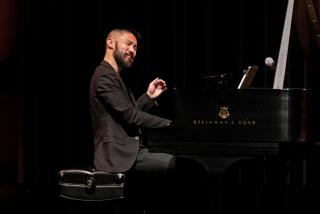MUSIC REVIEW : Veteran Pianist Cherkassky at Ambassador
- Share via
He resembles an aging gnome, walks like Jack Benny and plays the piano like an angel. Still.
At 76, Shura Cherkassky remains one of a small band of veteran pianists--Arrau, Bolet, Gimpel and Serkin are some of the others--who link our sometimes mundane musical world with the legendary past. At his latest local appearance, Wednesday night at Ambassador Auditorium in Pasadena, the petite, Odessa-born musician displayed again the pianistic virtues, the fabled technique and irrepressible devotion to sound that comprise that link.
A sense of invention, of the rhapsodic, of emotions suddenly stirred up characterizes Cherkassky’s personal style at the keyboard.
The beauteous elements he seemed to create, as if for the first time, in Chopin’s F-minor Nocturne (Opus 55, No. 1) and Barcarolle gave the impression that he had just thought them up--such is the immediacy of his stage presence and his masterful address of the instrument.
Similarly, the myriad moods, the full range of pianistic colors and the nuances of feeling he presented in Schumann’s over-familiar “Carnaval,” sounded new and fresh, even to some who had just heard the suite the night before at the Music Center.
This kind of individuality has at times earned Cherkassky a reputation for musical distortion and willfulness. That reputation proved utterly unearned on Wednesday.
In everything the pianist played--and his program also offered Cesar Franck’s “Prelude, Choral et Fugue,” Rachmaninoff’s Variations on a Theme of Corelli, Josef Hofmann’s “Kaleidoscop” and Liszt’s Paraphrase on a Waltz from Gounod’s “Faust”--Cherkassky’s emotional freedom was held in check by an elegant understatement.
Yet every musical sentence here spoke eloquently, combining artistic insight, stylistic detail and the pertinent use of a broad and abundant technical arsenal.
The F-minor Nocturne has seldom been intoned with such a velvet, singing sound. Rachmaninoff’s neo-classical Variations, which look forward almost tangibly to the “Paganini” Rhapsody, benefited from a tightness of concept and dynamics which revealed rather than repressed its wide-ranging expressive content.
And the Franck work, delivered in what can best be described as a musical whisper, rather than in the self-conscious, stentorian style others bring to it, fairly vibrated with nuance, tone-shadows and a pre-Impressionistic haze. This was a needed reminder that Franck’s music gives up its secrets most easily when treated as inward-looking, not outgoing.
After this genuinely taxing program, the veteran pianist showed no signs of fatigue, and seemed pleased to offer his appreciative audience three encores: a decorative transcription by Leopold Godowsky of Albeniz’s sensuous “Tango in D”; a Polka by Rachmaninoff, and “October,” from Tchaikovsky’s “The Seasons.”
More to Read
The biggest entertainment stories
Get our big stories about Hollywood, film, television, music, arts, culture and more right in your inbox as soon as they publish.
You may occasionally receive promotional content from the Los Angeles Times.










